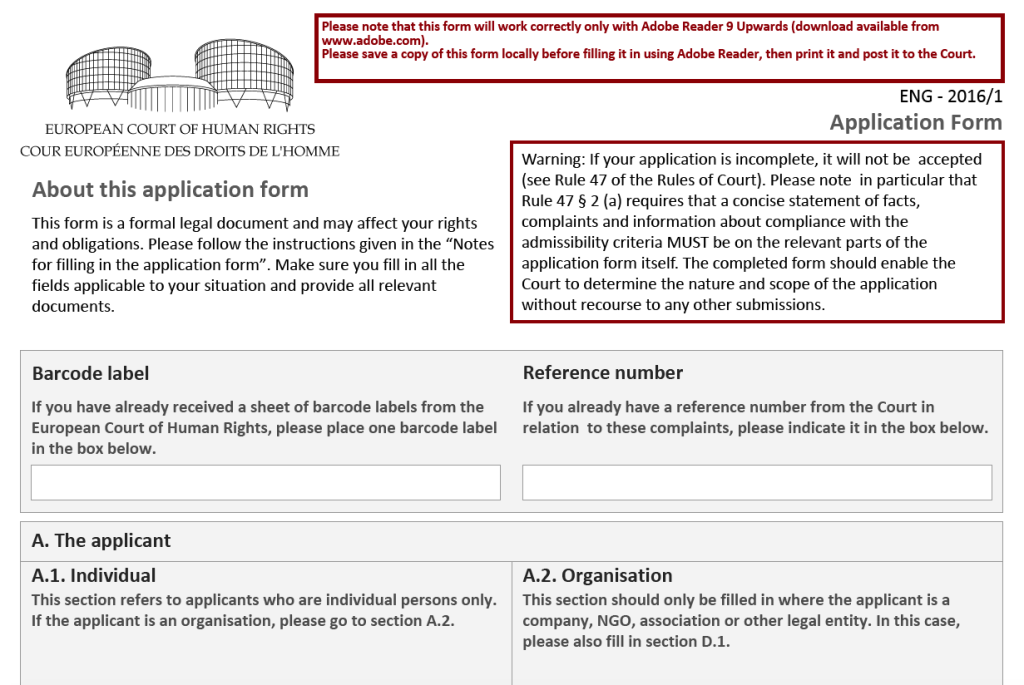 Beginning on January 1, 2016, the European Court of Human Rights (ECtHR) will require individuals and entities submitting complaints of alleged human rights violations to use a new application form and to provide additional information regarding their representation before the tribunal. [ECtHR Press Release] By amending Rule 47 of the Rules of the Court, the Court now formally requires applicants to submit certain details concerning the person or lawyer authorized to represent them, along with proof of that authorization. These changes seem intended to reduce miscommunication with applicants and alleviate doubts regarding representatives’ power to interact with the Court. See ECtHR, Bringing an Application: Changes to the Rules and Application Form with Effect from 1 January 2016 (2015).
Beginning on January 1, 2016, the European Court of Human Rights (ECtHR) will require individuals and entities submitting complaints of alleged human rights violations to use a new application form and to provide additional information regarding their representation before the tribunal. [ECtHR Press Release] By amending Rule 47 of the Rules of the Court, the Court now formally requires applicants to submit certain details concerning the person or lawyer authorized to represent them, along with proof of that authorization. These changes seem intended to reduce miscommunication with applicants and alleviate doubts regarding representatives’ power to interact with the Court. See ECtHR, Bringing an Application: Changes to the Rules and Application Form with Effect from 1 January 2016 (2015).
As with other application requirements, failure to satisfy these new conditions will generally result in the application being rejected. While applications submitted this year must use the new form, the Court will still accept applications using the old form that were mailed before January 1, 2016 but received after that date. See id.
Changes to Rule 47
Rule 47 identifies all the pieces of information applicants must provide when submitting a complaint to the European Court. The amendments that entered into force on January 1, 2016 require applicants to provide the following:
- where the applicant is represented, the dated and original signature of the applicant on the authority section of the application form; the original signature of the representative showing that he or she has agreed to act for the applicant must also be on the authority section of the application form. (Rule 47(1)(c))
- where the applicant is a legal person as referred to in Rule 47 § 1 (a), a document or documents showing that the individual who lodged the application has the standing or authority to represent the applicant. (Rule 47(3)(1)(d))
The previous Rules of Court (2015) can be viewed online. Prior to the amendments, the representative’s signature was not required on the application.
Though not stated in the new Rule 47, the Court has made clear that it now requires the name and contact information for the relevant officer or official acting on behalf of a legal person (company or organization) applicant before the Court, meaning that it expects the application to include the specific details of who at the company or organization will be responsible for managing the correspondence and proceedings before the Court. See ECtHR, Bringing an Application: Changes to the Rules and Application Form with Effect from 1 January 2016 (2015). This information is requested on page four of the new application. Additionally, pursuant to Rule 47(3)(1)(d), the Court now demands proof that this person is legally authorized to act on behalf of the applicant company or organization; this proof may include, for example, the entity’s domestic registration or meeting minutes.
Changes to the Application Form
The Court has made changes to its application form, including revisions necessary to reflect the amendments to Rule 47. These changes include:
- a box for the applicant’s representative to provide his or her signature in the authority section;
- an additional page for the applicant to identify the articles of the European Convention on Human Rights relevant to the application and to explain how these rights have been violated; and,
- a field for the applicant to fill in his or her place of birth.
Additional Information
To learn more about the European Court of Human Rights, visit the IJRC Online Resource Hub. To read an explanation of prior amendments to Rule 47, which took effect in 2014, see our prior news post. For details on submitting an application to the ECtHR, visit its webpage on how to Apply to the Court.
